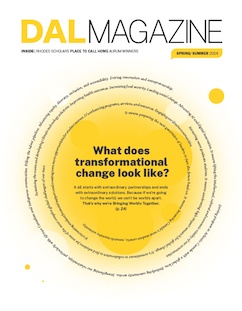Stephanie MacPhee (BENG'06), Dal’s executive director of the Office of Sustainability, takes a multifaceted approach to lessening Dal’s impact on the planet.
Her backstory: Stephanie MacPhee will be the first to share that a career in sustainability was not an obvious choice for her. But of the paths she’s chosen over the course of her career to date, an underlying passion for reducing our impact on the planet has made a subtle yet consistent appearance. MacPhee studied physics in her undergrad, and originally thought she’d go to medical school. Her father however, an engineer, provided a model for an alternative to that choice. Though he didn’t work in the environmental field, seeing what he did gave MacPhee enough information to see engineering as a possibility. Cue the environmental engineering program at Dal. Her research and subsequent consulting work was in contaminated site engineering for large industrial areas, such as defunct gas stations or chemical plants. It’s not uncommon for contaminants from these sites to seep into the groundwater and impact their neighbouring communities. Part of her work included sampling the water and soil in these areas. While she loved the experiences and opportunities field work provided, it still wasn’t her perfect fit. MacPhee spent time consulting, first in non-profits and then finally in a university setting. In January, MacPhee accepted her role as the executive director of Dal’s Office of Sustainability.
Highlights: Looking at MacPhee’s portfolio in her new role, there are countless projects for her to dig into, from developing and implementing carbon reduction strategies and university waste reduction and diversion strategies, to student-focused programs and sustainable procurement. MacPhee speaks excitedly about the experience of returning to campus after her time as a student. “As a student you’re so focused on your studies that you don’t think about all of the other aspects of the university. There’s a whole other engine—the facilities group, the operations team—who work to heat and cool the campus and make sure the lights are on,” she says. “You begin to realize how important these groups are.” MacPhee recently explored Dal’s LEED Platinum buildings and features, such as the geothermal field, green roof, solar photovoltaic systems, and cistern that help increase energy efficiency, save water and reduce the carbon footprint of Dal’s campuses. One project that MacPhee is excited to bring to Dal is a Free Store program (login required). The store would see items collected during student move-out times—household goods, kitchenwares and other items in good condition that might otherwise be left behind or end up in a landfill— made available during orientation in the fall. She saw first hand the impact of similar programs and sees the potential in an area like Halifax. “It’s a program that I have started before and it was very successful. Students were so excited about it and it also hits on the affordability piece in a time where people are strained with their budgets,” says MacPhee.
Further reading: Dal's Emera IDEA and Richard Murray Design buildings achieve LEED Platinum status in first for the university
Why I do it: Originally from Nova Scotia, MacPhee is thankful for the opportunity to be back home after 16 years in Ontario and abroad. She commends the work of those who came before her, the expertise of her new colleagues across campus, and the passion of the students that are both studying and championing sustainability on campus. “I think for me, it’s always been important to do something that I feel is meaningful,” MacPhee says. “We often feel overwhelmed and like the world is crashing down upon us. Eco-grief is a real thing, and you start to wonder if small things matter. Just remember that they do.”
This story appeared in the DAL Magazine Spring/Summer 2024 issue. Flip through the rest of the issue using the links below.


